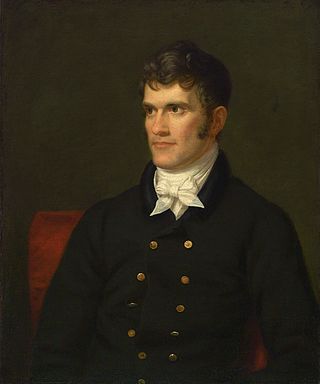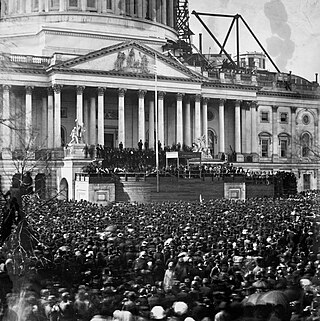Related Research Articles

Andrew Jackson was an American politician and lawyer who served as the 7th president of the United States from 1829 to 1837. Before his presidency, he rose to fame as a general in the U.S. Army and served in both houses of the U.S. Congress. Jackson's legacy is controversial. He has been praised as an advocate for working Americans and preserving the union of states, and criticized for his racist policies, particularly towards Native Americans. His political philosophy became the basis for the Democratic Party.

The Kentucky and Virginia Resolutions were political statements drafted in 1798 and 1799 in which the Kentucky and Virginia legislatures took the position that the federal Alien and Sedition Acts were unconstitutional. The resolutions argued that the states had the right and the duty to declare unconstitutional those acts of Congress that the Constitution did not authorize. In doing so, they argued for states' rights and strict construction of the Constitution. The Kentucky and Virginia Resolutions of 1798 were written secretly by Vice President Thomas Jefferson and James Madison, respectively.

Presidential elections were held in the United States from November 2 to December 5, 1832. Incumbent president Andrew Jackson, candidate of the Democratic Party, defeated Henry Clay, candidate of the National Republican Party.

John Caldwell Calhoun was an American statesman and political theorist who served as the seventh vice president of the United States from 1825 to 1832. Born in South Carolina, he adamantly defended American slavery and sought to protect the interests of white Southerners. Calhoun began his political career as a nationalist, modernizer and proponent of a strong federal government and protective tariffs. In the late 1820s, his views changed radically, and he became a leading proponent of states' rights, limited government, nullification, and opposition to high tariffs. Calhoun saw Northern acceptance of those policies as a condition of the South's remaining in the Union. His beliefs heavily influenced the South's secession from the Union in 1860 and 1861. Calhoun was the first of two vice presidents to resign from the position, the second being Spiro Agnew, who resigned in 1973.
The Tariff of 1828 was a very high protective tariff that became law in the United States on May 19, 1828. It was a bill designed to fail in Congress because it was seen by free trade supporters as hurting both industry and farming, but it passed anyway. The bill was vehemently denounced in the South and escalated to a threat of civil war in the Nullification Crisis of 1832–33. The tariff was replaced in 1833, and the crisis ended. It was called the "Tariff of Abominations" by its Southern detractors because of the effects it had on the Southern economy. It set a 38% tax on some imported goods and a 45% tax on certain imported raw materials.

The Force Bill, formally titled "An Act further to provide for the collection of duties on imports", 4 Stat. 632 (1833), refers to legislation enacted by the 22nd U.S. Congress on March 2, 1833, during the nullification crisis.

Abram Marshall Scott was a politician in Mississippi. He was born in Edgefield County in the Province of South Carolina. He was an early settler of Wilkinson County, Mississippi and was instrumental in founding the town of Woodville, Mississippi. He held local political offices before his election to the Mississippi State Senate. As President of the Mississippi Senate he also served as Lieutenant Governor of Mississippi. He belonged to the National Republican Party.
Nullification may refer to:

The nullification crisis was a sectional political crisis in the United States in 1832 and 1833, during the presidency of Andrew Jackson, which involved a confrontation between the state of South Carolina and the federal government. It ensued after South Carolina declared the federal Tariffs of 1828 and 1832 unconstitutional and therefore null and void within the sovereign boundaries of the state.

The South Carolina Exposition and Protest, also known as Calhoun's Exposition, was written in December 1828 by John C. Calhoun, then Vice President of the United States under John Quincy Adams and later under Andrew Jackson. Calhoun did not formally state his authorship at the time, though it was widely suspected and later confirmed.

Robert Young Hayne was an American politician. He served in the United States Senate from 1823 to 1832, as Governor of South Carolina 1832–1834, and as Mayor of Charleston 1836–1837. As Senator and Governor, he was a leading figure in the Nullification Crisis and, along with John C. Calhoun and James Hamilton Jr., a vocal proponent of the doctrines of states' rights, compact theory, and nullification; his 1830 debate in the Senate with Daniel Webster is considered a defining episode in the constitutional crisis which precipitated the American Civil War.

The Tariff of 1833, enacted on March 2, 1833, was proposed by Henry Clay and John C. Calhoun as a resolution to the Nullification Crisis. Enacted under Andrew Jackson's presidency, it was adopted to gradually reduce the rates following Southerners' objections to the protectionism found in the Tariff of 1832 and the 1828 Tariff of Abominations; the tariffs had prompted South Carolina to threaten secession from the Union. This Act stipulated that import taxes would gradually be cut over the next decade until, by 1842, they matched the levels set in the Tariff of 1816—an average of 20%. The compromise reductions lasted only two months into their final stage before protectionism was reinstated by the Black Tariff of 1842.
The Tariff of 1832 was a protectionist tariff in the United States. Enacted under Andrew Jackson's presidency, it was largely written by former President John Quincy Adams, who had been elected to the House of Representatives and appointed chairman of the Committee on Manufactures. It reduced the existing tariffs to remedy the conflict created by the Tariff of Abominations, but it was still deemed unsatisfactory by some in the South, especially in South Carolina, causing the Nullification crisis. As a result of this crisis, the 1832 Tariff was replaced by the Compromise Tariff of 1833.
A concurrent majority is a majority composed of majorities within various subgroups. As a system of government, it means that "major government policy decisions must be approved by the dominant interest groups directly affected ... each group involved must give its consent". There must be majority support within each affected group concurrently.
The Nullifier Party was an American political party based in South Carolina in the 1830s. Considered an early American third party, it was started by John C. Calhoun in 1828.
Nullification, in United States constitutional history, is a legal theory that a state has the right to nullify, or invalidate, any federal laws that they deem unconstitutional with respect to the United States Constitution. There are similar theories that any officer, jury, or individual may do the same. The theory of state nullification has never been legally upheld by federal courts, although jury nullification has.

The presidency of Andrew Jackson began on March 4, 1829, when Andrew Jackson was inaugurated as 7th President of the United States, and ended on March 4, 1837. Jackson took office after defeating incumbent President John Quincy Adams in the bitterly contested 1828 presidential election. During the 1828 presidential campaign, Jackson founded the political force that coalesced into the Democratic Party during Jackson's presidency. Jackson won re-election in 1832, defeating National Republican candidate Henry Clay by a wide margin. He was succeeded by his hand-picked successor, Vice President Martin Van Buren, after Van Buren won the 1836 presidential election.

Abraham Lincoln's first inaugural address was delivered on Monday, March 4, 1861, as part of his taking of the oath of office for his first term as the sixteenth president of the United States. The speech, delivered at the United States Capitol, was primarily addressed to the people of the South and was intended to succinctly state Lincoln's intended policies and desires toward that section, where seven states had seceded from the Union and formed the Confederate States of America.
The Proclamation to the People of South Carolina was written by Edward Livingston and issued by Andrew Jackson on December 10, 1832. Written at the height of the Nullification Crisis, the proclamation directly responds to the Ordinance of Nullification passed by the South Carolina legislature in November 1832. Its purpose was to subdue the Nullification Crisis created by South Carolina's ordinance and to denounce the doctrine of nullification.
Robert James Turnbull was an American lawyer, planter, writer and politician from South Carolina who also published under the name Brutus. His essays in the Charleston Mercury advocating nullification were published as a pamphlet under the title The Crisis: Or, Essays on the Usurpations of the Federal Government, which has been described as "the handbook for nullification and resistance."
References
- ↑ "Avalon Project – South Carolina Ordinance of Nullification, November 24, 1832". avalon.law.yale.edu. Retrieved 2017-03-23.
- ↑ The Doctrines of Nullification and Succession, A Historical Study; Mouse, Howard Newcomb; http://heinonline.org/HOL/LandingPage?handle=hein.journals/sclr2&div=30&id=&page=
- ↑ The Life of Andrew Jackson; HJ Sage; 2011; http://www.saylor.org/site/wp-content/uploads/2012/02/ENGL405-1.2.3-The-Life-of-Andrew-Jackson.pdf